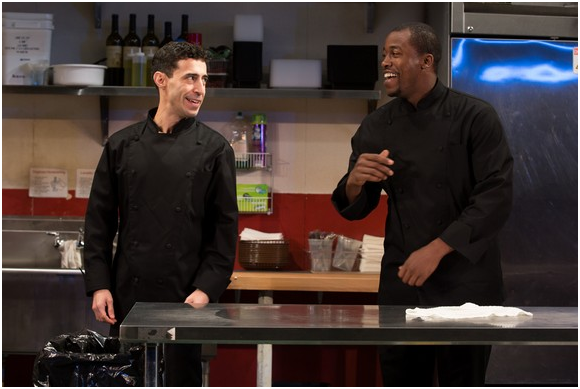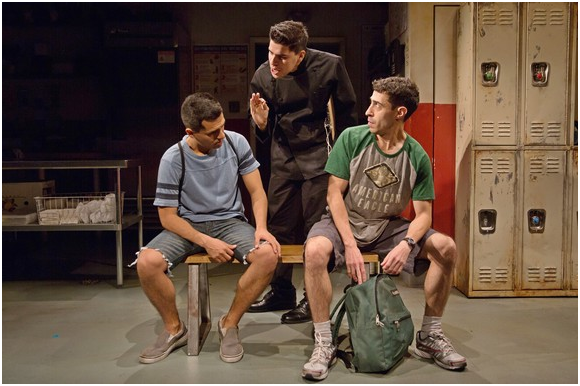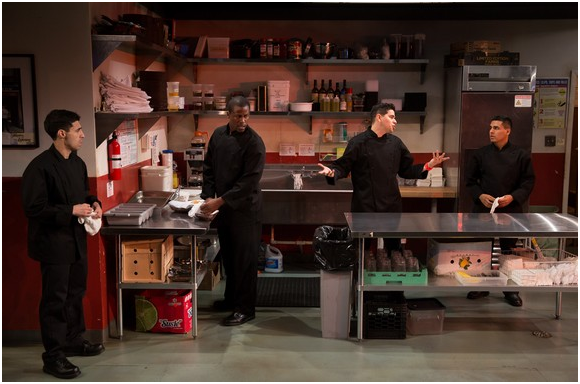My Mañana Comes

José Joaquín Pérez and Jason Bowen
in a scene from My Mañana Comes
(Photo credit: Matthew Murphy)
Plays set in kitchens or restaurants tend to have a political message or to be used as a metaphor for society like Arnold Wesker’s The Kitchen and Gunter Grass’ The Wicked Cooks. Elizabeth Irwin’s My
Mañana Comes, the newest offering of The Playwrights Realm, is unusual in that the play is a study in sociology dealing mainly with the plight of undocumented workers. Her portrait of busboys and runners is authentic and believable making their lives (and dreams) both in the restaurant and on the outside vividly compelling. However, Chay Yew’s layered direction cannot obscure the fact that the play’s approximately 17 sequences tend to repeat themselves before the final galvanizing crisis, the possibility that the shift pay will be eliminated and that the men will have to survive on only their tips. Nevertheless, the cast of four appears to be living their roles and the play is a view into a world unfamiliar to most theatergoers.
My Mañana Comes takes place during a few weeks following Memorial Day weekend in the kitchen of an upscale French restaurant on Manhattan’s Madison Avenue and 66th Street. Although we hear a good deal about general manager Fabryce, he is nowhere to be seen as he is in the Hamptons opening another restaurant. Instead the restaurant is being run by the off-stage Laurent whose summer scheduling does not seem to please the workers. We watch as Peter, Jorge, Pepe and Whalid fold and roll napkins, fill bread baskets and water pitchers, cut lemons and limes, deliver prepared food and coffee to the tables, and return dirty dishes to the kitchen. Irwin’s play quickly establishes the daily routine of these busboys (the workers who clean up) and runners who deliver the meals for the waiters. Dressed in Moria Sine Clinton’s black uniforms, the actors quickly establish themselves as individuals.

Reza Salazar, Brian Quijada and José Joaquín Pérez
in a scene from My Mañana Comes
(Photo credit: Matthew Murphy)
In addition, we get to know these twenty-something men intimately with three-dimensional portraits of very different types: two are Americans, two undocumented Mexicans; two are veterans and two are recent hires. African American Peter (Jason Bowen), who has worked four years in the restaurant, has little ambition other than caring for his five year old daughter and long-time girlfriend. His income never seems to be enough for his family’s needs, but he is a born leader and the others look up to him. Jorge (José Joaquín Pérez) has come from Puebla, Mexico, in order to raise enough money to buy a house back home. He is only six months away from achieving his goal of four years of saving before he returns to his wife and children who no longer remember him. Reliable and steady, he spends as little as he can, as well as revealing as little as necessary about his life and dreams. He is an attentive observer of the life in the restaurant.
Unlike Peter and Jorge, the other two men know little about budgeting. Whalid (Brian Quijada) who has only worked in the restaurant a few weeks is studying to take an Emergency Medical Technician’s test. However, in the meantime, this handsome, fast-talking Brooklyn-born third generation Mexican American spends his money as fast as he makes it on his many girlfriends and flashy clothes while living at home with his parents. Pepe (Reza Salazar), on the other hand, the other illegal alien, has emigrated from Juarez three months ago so that he is not the newbie. Unfortunately, his limited ability with the English language puts him at a disadvantage and he comically misunderstands a great many things which makes him the butt of many jokes. Worst of all, he is childish in his spending, wanting instant gratification and then often not having enough money left to pay for his room and board. Easily excitable, he is also willing to work long hours without complaining.
Very early in the play the men discover that Laurent knows nothing about their shift pay and that they must wait to ask Fabryce when he arrives for the weekly menu meeting on the following Tuesday. Tempers rise as pocket money becomes tight and Tuesday’s arrival can’t come quickly enough. However, what will they do if it is true that there is to be only tips in the future? This ultimate question does not get asked until quite late in the play so that much of the evening is a waiting game even at a running time of only 90 minutes. Aside from the general scenes in the restaurant and the locker room depicted onstage alongside it, each of the actors has a monologue either spoken to an unseen relative or a phone conversation home to a family member. These are very revealing but rather jarring to the overall rhythms of the play. Wilson Chin’s complete, working red and white kitchen adds another authentic note of realism to the drama.

José Joaquín Pérez, Jason Bowen, Brian Quijada and
Reza Salazar in a scene from My Mañana Comes
(Photo credit: Matthew Murphy)
The cast of four is excellent, making their roles totally credible. We watch and listen to their easy camaraderie as they work and insult each other side by side each day. As Peter, Bowen captures the upbeat mood of a happy man who doesn’t realize that he is drowning in problems. Quijada’s Whalid has the easy swagger of the player who doesn’t worry about tomorrow. Perez beautifully delineates the grim seriousness of Jorge, a man with a purpose with every moment focused on his goal. Reza Salazar has the most complex role as Pepe, new to New York, unfamiliar with English, periodically unable to pay his bills as he tries to send home more money than he can afford to the brother back home, and looking over his shoulder at all times for immigration officers. Yew’s direction is always true-to-life and representational. The lighting by Nicole Pearce accommodates the changes of time and day, as well as setting off the monologues (spoken directly to the audience) from the rest of the play.
Elizabeth Irwin’s My Manana Comes is a sensitive and sympathetic portrait of the lives of undocumented aliens as well as a picture of a workplace rarely depicted on our stages. Other than the leisurely pace of the storyline until nearly the end, this is an engrossing slice of life drama that showcases terrific acting of a high realistic caliber.
My Mañana Comes (through September 20, 2014)
The Playwrights Realm
Peter Jay Sharp Theater, 416 W. 42nd Street, in Manhattan
For tickets, call 212-279-4200 or visit http://www.ticketcentral.com
Running time: 90 minutes with no intermission

Leave a comment